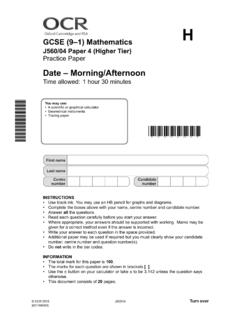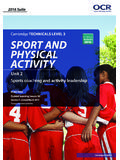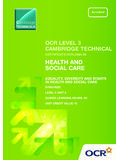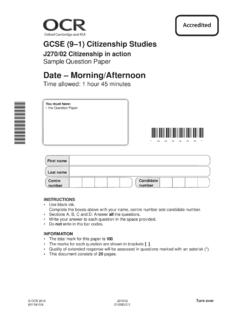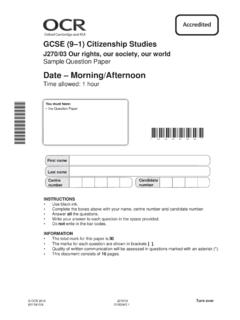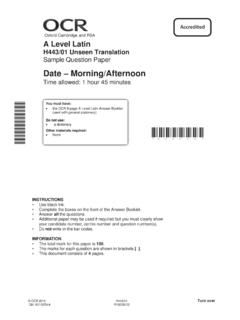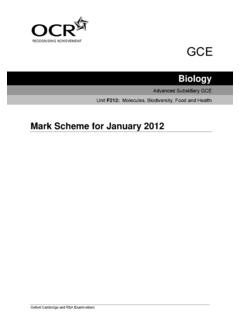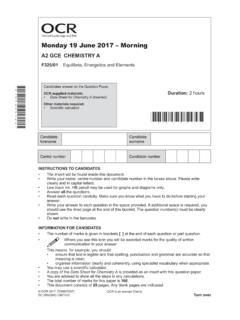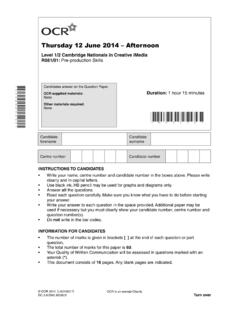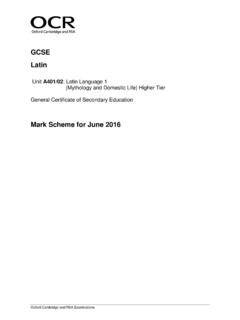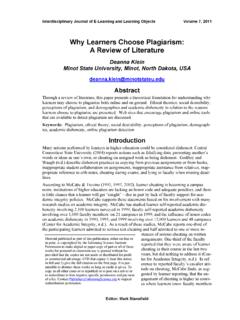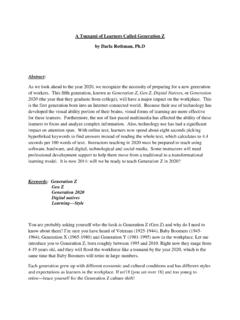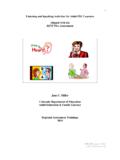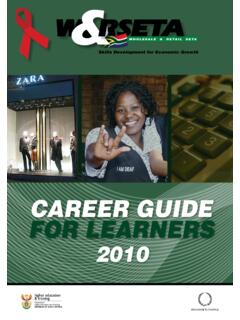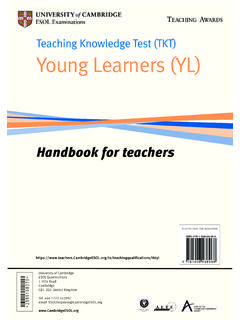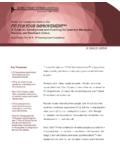Transcription of Teacher Guide ENGLISH LANGUAGE - ocr.org.uk
1 QualificationAccreditedGCSE (9 1) Teacher GuideENGLISH LANGUAGEJ351 For first teaching in 2015 Preparing learners for their Spoken LANGUAGE assessmentVersion OCR 2015 GCSE (9 1) ENGLISH LanguageTeacher GuidePreparing learners for their Spoken LANGUAGE assessmentThe Spoken LANGUAGE assessment in the GCSE ENGLISH LANGUAGE (9-1) qualifications is a separately endorsed component, for which candidates will be graded Pass, Merit or Distinction. Candidates who do not achieve a Pass grade, or those who do not take the component, will be given Not must undertake a prepared spoken presentation on a specific topic. The key requirements are: Presentations must be formal but may take a wide variety of forms, including talks, debates, speeches and dialogues.
2 Presentations must be planned and organised. The subject for the presentation must be decided in advance and agreed with the Teacher . learners may use pre-prepared notes, PowerPoint etc. to assist them during their presentations but this is not a requirement. As part of, or following, the presentation, learners must listen to and respond appropriately to questions and feedback. Where the audience is the Teacher only, the presentation and dialogue must be designed in such a way that it could have a potentially wider audience than just one person ( it replicates a television interview).G C S E (9 1) ENGLISH LANGUAGE3 Copyright OCR 2015 GCSE (9 1) ENGLISH LanguageTeacher GuideLearning and assessment objectivesThere are three assessment objectives for the Spoken LANGUAGE endorsement:AO7: Demonstrate presentation skills in a formal : Listen and respond appropriately to spoken LANGUAGE , including to questions and feedback to : Use spoken Standard ENGLISH effectively in speeches and should have a number of opportunities to develop the skills necessary for their Spoken LANGUAGE assessment.
3 In order to provide learners with enough time to develop their skills, it is recommended that this assessment should not take place until the later stages of the GCSE ENGLISH LANGUAGE skills being developed are: Expressing ideas and opinions in a formal setting Organising a presentation for maximum impact on an audience Achieving the purpose of the presentation Listening carefully and responding appropriately to skills can be developed by giving learners opportunities to present ideas and opinions when studying other aspects of their GCSE ENGLISH LANGUAGE and ENGLISH Literature courses. Offering wide opportunities to present, discuss and debate will develop these skills naturally as part of their ENGLISH studies.
4 It will also build up their confidence about presenting to the rest of the OCR 2015 GCSE (9 1) ENGLISH LanguageTeacher GuideSuggestions for appropriate activities for skill development1. Developing independent reading skills unseen passage speed dating Put the class into groups of 5 different reading passages on tables around the room. The passages should be stuck in the middle of a large sheet of paper and coloured pens provided on each group starts at a table and has 5 minutes to read the passage and write notes/questions about the writer s intentions and to provide an overview of the 5 minutes the Teacher should signal to move the groups to the next table. They then have 5 minutes to read that passage and add to the comments and questions of the last group.
5 They should add to them by looking at how the writer uses LANGUAGE and techniques to achieve the the groups move back to the table they started at, they have 15 minutes to study the comments written on the passage and they will then present that passage to the rest of the class offering an interpretation of the writer s intentions and an overview of its meaning and Studying literary techniquesPut the learners in them to write down a metaphor that describes them as a learner (they should do this individually).Ask them to read their metaphor to their partner and explain the thinking behind their choice. They can ask one another questions to clarify the thinking and probe each member of the class to introduce their partner, read their metaphor and explain their partner s view of themselves as a Studying a 19th-century textWhen studying the context of a 19th-century text (a non-fiction text as part of the GCSE ENGLISH LANGUAGE course or a novel as part of the GCSE ENGLISH Literature course)
6 , put the class into groups of group is given a particular aspect of the context to should design a poster/diagram for their research findings and present it to the posters can then be displayed in the Studying ShakespearePut learners into groups of three to study a character from their Shakespeare play (as part of their GCSE ENGLISH Literature course).They should prepare a presentation, including a PowerPoint on their assigned groups they present their character to the OCR 2015 GCSE (9 1) ENGLISH LanguageTeacher GuideStudying effective communication and presentational skillsWhen preparing for the final assessment in Spoken LANGUAGE , it will be necessary to focus on more specific presentational skills and rhetorical devices.
7 A good starting point is to watch some talks and discuss how and why they are effective for the are a number of talks on the following website that are likely to interest teenagers: Russell on being a model is a good example: watching a talk, focus on general impressions first: Was it interesting? Did it hold their interest? Did they learn anything? Did it change or develop their views and opinions? Did they think the speaker had personal involvement in/experience of/knowledge of the subject?When you have discussed their impressions, ask learners to identify any rhetorical devices/ techniques that the speaker used such as:Rhetorical questionsResponse to audienceUsing anecdotes or stories to prove a pointHumourEmphasis on individual words/phrasesEye contact/body languageGestureEmotive LANGUAGE Pace and use of pausesChange of sure that they relate their experiences as the audience to the aims and purpose of the OCR 2015 GCSE (9 1) ENGLISH LanguageTeacher GuideThe AssessmentThe Spoken LANGUAGE assessment requires learners to create a spoken presentation followed by questions from the audience.
8 As a Guide , the duration of the whole assessment should be no more than 10 minutes, which can be divided into 4-5mins presentation and 4-5mins questions and feedback from the audience. learners can choose any topic to speak on, but to achieve the higher grades their topic needs to involve a level of complexity. Make sure that the learners understand that their choice of topic could limit the potential of their presentation, particularly in terms of expressing straightforward/challenging/sophisticate d ideas and assessment criteria table is concise and easily explained to learners it can be put on a whiteboard and discussed with them. It is a competency-based assessment, which means that learners must fulfil all the criteria necessary to achieve a particular grade.
9 Assessment criteria To be awarded a Pass, Merit or Distinction a Learner must be audible, and use Spoken Standard ENGLISH which, for the purposes of the spoken LANGUAGE assessment, means that a Learner must be intelligible, and generally use LANGUAGE appropriate to the formal setting of the presentation. You may wish to use some of the recorded standardisation material provided by the awarding bodies at this point. These are available on the GCSE ENGLISH LANGUAGE webpage under the Candidate exemplars tab. You could show the learners two of the assessments and ask them to discuss them in pairs using the assessment criteria. Explaining the grades that they were actually awarded will ensure that learners understand the implications of a competency-based assessment, where they must satisfy all the criteria in a grade level to be awarded that addition to the general criteria, to be awarded a Pass a Learner s performance in his or her spoken LANGUAGE assessment must meet all of the following criteria expresses straightforward ideas / information / feelings, makes an attempt to organise and structure his or her presentation, makes an attempt to meet the needs of the audience, and listens to questions / feedback and provides an appropriate response in a straight forward manner.
10 In addition to the general criteria, to be awarded a Merit a Learner s performance in his or her spoken LANGUAGE assessment must meet all of the following criteria expresses challenging ideas / information / feelings using a range of vocabulary, organises and structures his or her presentation clearly and appropriately to meet the needs of the audience, achieves the purpose of his or her presentation, and listens to questions / feedback responding formally and in some detail. In addition to the general criteria, to be awarded a Distinction a Learner s performance in his or her spoken LANGUAGE assessment must meet all of the following criteria expresses sophisticated ideas / information / feelings using a sophisticated repertoire of vocabulary, organises and structures his or her presentation using an effective range of strategies to engage the audience, achieves the purpose of his or her presentation, and listens to questions / feedback, responds perceptively and if appropriate elaborates with further ideas and OCR 2015 GCSE (9 1) ENGLISH LanguageTeacher GuideChoosing topicsLearners will have 4-5 minutes to speak on a topic or a theme that most interests them.
